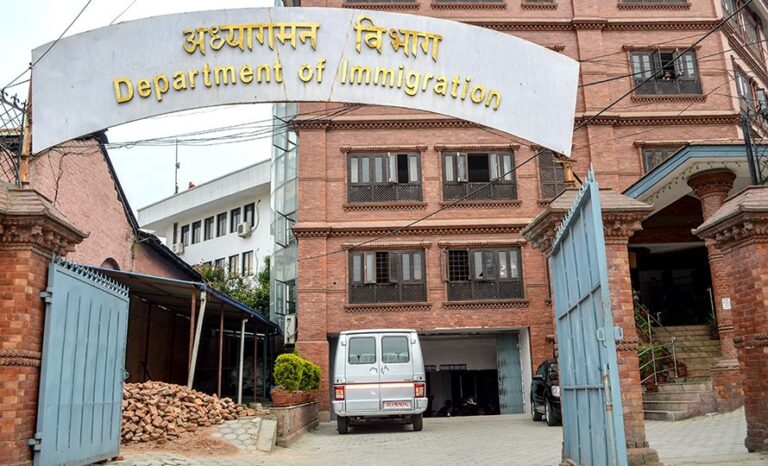
The Department of Immigration has prepared an amendment draft to the Immigration Procedure-2065 BS which discriminates against women going abroad on visit (tourist) visas.
The Department is preparing to amend the existing procedure with a provision that women under the age of 40, who have no relatives in the destination country and are going to Africa and Gulf countries for the first time, should procure recommendation of the local level authorities or a letter of approval from their family.
The Department has sent the amendment draft to the Home Ministry for approval.
The proposed amendment is in contrary to the provisions related to fundamental rights of all citizens, regardless of their gender, including freedom and equality ensured by Nepal’s constitution.
The draft sent to the Ministry reads, “Women in the vulnerable group of below 40 years must seek the consent of family members or the recommendation of the concerned local level authority when traveling abroad alone.”
The draft also mentions that those traveling abroad on tourist visa must have life insurance worth Rs 1.5 million. The life insurance provision is applicable to men and women.
The Director General of the Department of Immigration, Ramesh Kumar KC, argued that such a provision was aimed at protecting women from being trafficked. He said that if the proposed draft was approved, it will be easier for immigration staff to make decisions based on clear legal provisions rather than discretionary powers.
Home Ministry spokesperson Chakra Bahadur Budha said, “Some strict provisions are being included in the working procedures for the prevention and control of human trafficking, illegal entry and sexual exploitation of women.”
The Department of Immigration has issued a press statement today that says ‘the said provision is currently being discussed and no decision has been made as of yet, so the public should not have any illusions”.
The current provision for traveling on tourist visa requires a valid passport or travel-related visa, a two-way air ticket, an open letter from the sponsor or cash/proof of foreign exchange of USD 1,000 or equivalent.
The new proposal adds Rs 1.5 million worth insurance for both men and women and family approval or local level recommendation for women under 40 years of age.
Earlier in November 2020, The Department had prepared a preliminary draft of the amendment to the procedure, saying that those traveling on tourist visas should speak English, have educational qualification of at least SEE-level, and possess life insurance of Rs 2 million.
However, after much protest, the Department eliminated the provisions of speaking English and SEE-level education.
The new proposal, which is in clear violation of the constitutional rights and are discriminatory against women, has naturally drawn widespread ire as well as criticism. Nepali women, at home and abroad, have taken to social media to condemn the regressive proposal.
Though women traveling abroad being questioned, or even harassed, by immigration officials is not a new thing, making legal provisions to restrict women’s autonomy is a step too far.
Ankita Adhikari shared her experience with immigration officials at the Tribhuwan International Airport saying, “I had to travel to Hyderabad of India because my brother had been in an accident and he was lying unconscious in a hospital bed, with no one by his side. He was in need of an emergency spinal surgery otherwise he’d die. But when I was at the Airport, immigration officials took me to a separate room, interrogated me, seized my phone, called my parents to check if my reason for traveling was authentic – all because I am a woman traveling alone. They wouldn’t believe my truth and kept harassing me, threatening that I might not be allowed to board my flight. I nearly missed my flight when they eventually let me go after my mother cried with them on the phone saying her son was about to die in a foreign land.”
She added, “So discriminatory behavior against women by security officials in the name of protecting us has always been present, but the government is trying to legalize it now.”
Many women have also pointed out that the government was trying to hide its incompetency to curb human trafficking and ensure women’s safety by restricting women’s freedom.
“The proposal is ridiculous and outrageous firstly because the government thinks women over 40 are not vulnerable to exploitation and secondly because women are not safe within the borders as they are raped and brutally murdered everyday while their families are left without justice. The government is eerily complacent with women and girls being abused at home,” said Sujana Shrestha, a college student.
Instead of ensuring justice, strictly implementing existing rules of law against gender-based violence, educating men better, working towards women empowerment in the country, and guaranteeing gender equity, the government has decided to take away women’s already limited autonomy in the name of “protecting” them.
Moreover, the top five officials at the Department of Immigration are all men. It is men who are making these decisions and rules on what they think is best for women. The new proposed provision is to be approved by the Home Ministry, its leader is a man. Of the total 25 Council of Ministers – only four are women.
Patriarchy at its best.






